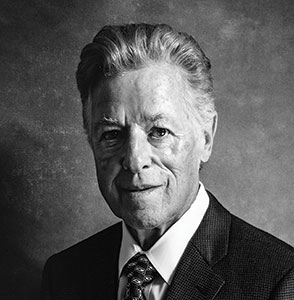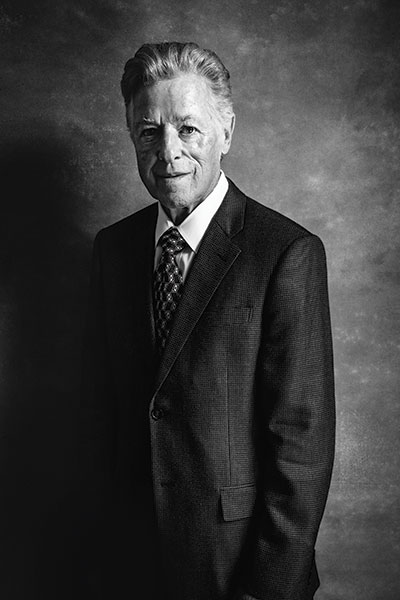Did Florio Have It Right All Along?
As New Jersey steered its way through a fiscal crisis in the 1990s, then-Governor Jim Florio, a 1962 graduate of the college, was forced to make some tough decisions that weren’t always popular with voters. Today, with the state again struggling to find its fiscal footing, voters might be wondering: Did Florio have it right all along?

 This fall, former New Jersey Gov. Jim Florio will be inducted into the New Jersey Hall of Fame. The award is in recognition of his accomplishments as a public servant, which include authoring the federal Superfund law and leading the state through troubled fiscal waters during his time in Trenton. TCNJ Magazine asked New Jersey’s former chief executive to reflect on his time in the State House and the pressing issues facing the Garden State.
This fall, former New Jersey Gov. Jim Florio will be inducted into the New Jersey Hall of Fame. The award is in recognition of his accomplishments as a public servant, which include authoring the federal Superfund law and leading the state through troubled fiscal waters during his time in Trenton. TCNJ Magazine asked New Jersey’s former chief executive to reflect on his time in the State House and the pressing issues facing the Garden State.
TCNJ Magazine: On May 20, 1990, The New York Times made Jim Florio its cover story. The headline read, “Read His Lips: More Taxes.” Inside, Peter Kerr wrote: “Outsiders first suspected that something unusual was afoot in Trenton, the sleepy capital on the bank of the Delaware River, several hours before Jim Florio took the oath of office as the 49th Governor of New Jersey…. Faced with a yawning deficit, Florio declared in his first budget address that he planned to raise…new taxes.” How did readers react to such frankness?
Gov. Florio: I think they liked it. People need to be engaged by politicians—from both parties. Griping doesn’t solve anything. We need citizens who are better informed. That’s how you build consensus. That’s why you were elected.
TCNJ Magazine: But let’s talk about that decision to raise sales and income taxes to balance the budget. Why was it necessary?
Gov. Florio: When I came into office, I was under the impression that New Jersey had a $400 million surplus. The reality was that we had a $600 million shortfall. Later on, the New Jersey Supreme Court rendered a decision on school financing [the Abbott decision] that said the poorest-performing school districts should be funded at the samerate as the highest-performing districts, which demanded a substantial increase in state school aid. We anticipated then a billion-dollar shortfall for the next budget beginning in July.
TCNJ Magazine: What did your package of new taxes include?
Gov. Florio: $1.1 billion in new sales taxes, a $1.2 billion increase in the income tax and a program of property tax rebates for people earning less than $70,000. Remember, every penny in the income tax in effect meant a reduction in property taxes, as well. We also made some substantial cuts in the budget.
TCNJ Magazine: You countered those who argued that only poor urban school districts should get more state aid, and you argued there was also a need to assist some hard-pressed suburban districts. Why?
Gov. Florio: I advocated for children, period. In other words, there were children living in suburban areas whose families were also economically hard pressed. But it was not included in our bill.
TCNJ Magazine: Did having a Democratic Legislature help?
Gov. Florio: Yes.
TCNJ Magazine: The so-called Tea Party isn’t very strong in New Jersey, but it’s certainly had an impact nationally. When you were governor, you encountered an early New Jersey version of it. Tell us about it.
Gov. Florio: [The group] was called Hands Across New Jersey. It consisted of guys walking around in oak barrels saying I had taken the shirts off their backs. A postman headed the group. In some respects they were promoted by 101.5, a central Jersey talk station. They had bumper stickers and held a protest in front of the State House. We found out later that the NRA sponsored them. What was interesting was I met with Hands Across New Jersey and asked if anyone in the room made more than $70,000. No one did. That meant they were not affected by the tax increases. With the homestead rebate I proposed, they actually were making money. So they were campaigning against these changes, yet they benefited most from them!
TCNJ Magazine: Nothing like that is happening in New Jersey today. In fact, not much is happening. Why?
Gov. Florio: We’re paralyzed by policy gridlock.
TCNJ Magazine: Is it the state’s biggest problem?
Gov. Florio: Yes. We need to do something. School budgets amount to 55 percent of local taxes. If a governor wants to do something about property tax, he or she must deal with school finances and find revenue.
TCNJ Magazine: So what should we be doing?
Gov. Florio: The answer to that question could fill a book; it’s very complex. What we most assuredly should not do is what we’re doing now, which is sweeping things under the rug. It’s folly.

TCNJ Magazine: Some might say the task of finding a workable solution to the issues facing New Jersey’s pension system has been swept under the rug for years now. Was the state’s pension system in good shape in 1990?
Gov. Florio: Yes. I was the last governor to fully fund the pension system.
TCNJ Magazine: How’s it doing today?
Gov. Florio: It’s a mess. The current pension system is radically underfunded, but no one wants to face up to that. But it’s not our only mess. We also have a transportation trust fund that is about to run out of money.
TCNJ Magazine: Let’s talk about some of the other issues vexing folks who want New Jersey out of its policy gridlock. Do we need another tunnel into New York?
Gov. Florio: Yes. Not building it was a particularly terrible thing. The stated reason was that it cost too much. The real reason was that the money was being diverted to fund the transportation fund. The irony here is that money that was supposed to go into the fund was diverted into the general fund.
TCNJ Magazine: New Jersey’s traditional economy appears to have collapsed. Has New Jersey figured out its future? Is manufacturing dead?
Gov. Florio: No. Manufacturing is doing reasonably well, but it’s capital intensive, and we don’t need as many workers. The jobs went because they automated. If you go to a plant today you will see robots.
TCNJ Magazine: What about “big pharma,” the nickname given the pharmaceutical industry? New Jersey was once called “the nation’s medicine chest.”
Gov. Florio: The same. When I was governor I remember going through manufacturing plants and seeing lots of workers. Today we have high-end operations that are more sales companies than manufacturers. They rely on small generic companies.
TCNJ Magazine: Should the state be creating jobs?
Gov. Florio: I’m told the tunnel project would have been worth 6,000 jobs. It was a major project. But does it make sense to help build a casino in an over-capacity area and one that’s gone into bankruptcy twice? Should we build a glorified mall in the
Meadowlands when there are more malls than you know what to do with? Should we help businesses move from one side of town to another, or from one town to another?
TCNJ Magazine: Should the state be doing more to promote gun control, one of your past and present passions?
Gov. Florio: Absolutely. When I was governor we banned assault weapons. Some people like to brag we have the toughest laws in the nation, but that’s like being the tallest building in Omaha. Even after the Connecticut massacre we couldn’t get more checking done or close the loopholes. I can be on the terrorist watch list and still buy a gun.
TCNJ Magazine: What about funding for higher education?
Gov. Florio: Schools need more money than when I was in office. For example, at that time 70 percent of the cost of college was funded by the state, and 30 percent by tuition and other sources. Now it’s reversed: 30 percent is funded by the state and 70 percent by tuition.
TCNJ Magazine: Has your lifestyle changed since you left Trenton?
Gov. Florio: Not much. We’ve lived in our house in Metuchen for 25 years. Lucinda takes care of the flowers and bushes, but I have a corner with sun all day that is mine. I plant tomatoes, cucumbers, peppers and string beans and have a grapevine on the garage that give us grapes. I call it the most intensely farmed place on earth. I’m half Irish and half Italian. My grandfather, Giuseppe, had fig trees and grapes on a patch of land that was only 30 by 40 feet. But he had more crops than you can imagine.
TCNJ Magazine: What about your personality? Has it changed?
Gov. Florio: It’s different. I have become intolerant of stupidity. I also have the luxury of being able to speak out.
TCNJ Magazine: You work full time as a founding partner at your firm, Florio Perrucci Steinhardt & Fader in New Jersey, New York and Pennsylvania. You also teach at Rutgers’ Bloustein School of Public Planning and Policy. Do you still work 80 to 100 hours a week?
Gov. Florio: No. I work full time and sit on a lot of boards, but the old craziness is gone. My firm, which does a lot of environmental work, also allows me to be creative.
TCNJ Magazine: How so?
Gov. Florio: We discovered you can monetize savings achieved by diverting storm water from wastewater by creating securities. We studied “green roofs” with plants that absorb water, preventing runoff. We examined concrete products that are permeable. Water runs through them and does not become runoff.
TCNJ Magazine: What do you do in your spare time?
Gov. Florio: I’ve thought about writing a book about public policy. Friends suggested I write about my life experience instead and how it shaped policy.
TCNJ Magazine: Are you thinking of channeling Jerry Brown and running for governor again?
Gov. Florio: No. I couldn’t afford the salary cut [laughs].
James Joseph Florio
Born: August 29, 1937, in Brooklyn, New York.
Education: BA, The College of New Jersey, 1962, graduated magna cum laude; graduate work, Columbia University, 1962–63, recipient of the Woodrow Wilson Fellowship; JD, 1967, Rutgers School of Law–Camden.
Military Service: United States Navy, 1955–58, ensign; United States Navy Reserve, 1958–75, lieutenant commander.
Political Career: New Jersey State Assembly, 1969–74; U.S. House of Representatives, 1975–90; Governor of New Jersey, 1990–94.
Current: Founding partner, Florio Perrucci Steinhardt & Fader, chairman of the firm’s energy, environmental law, government and regulatory affairs and healthcare law groups; Senior Fellow for Public Policy and Administration, Edward J. Bloustein Graduate School of Public Policy, Rutgers University; member, Board of Directors of the NJ Health Care Quality Institute; co-chairman, Regional Plan Association’s New Jersey Committee; member, Board of Trustees Fund for New Jersey.
Posted on September 29, 2014

